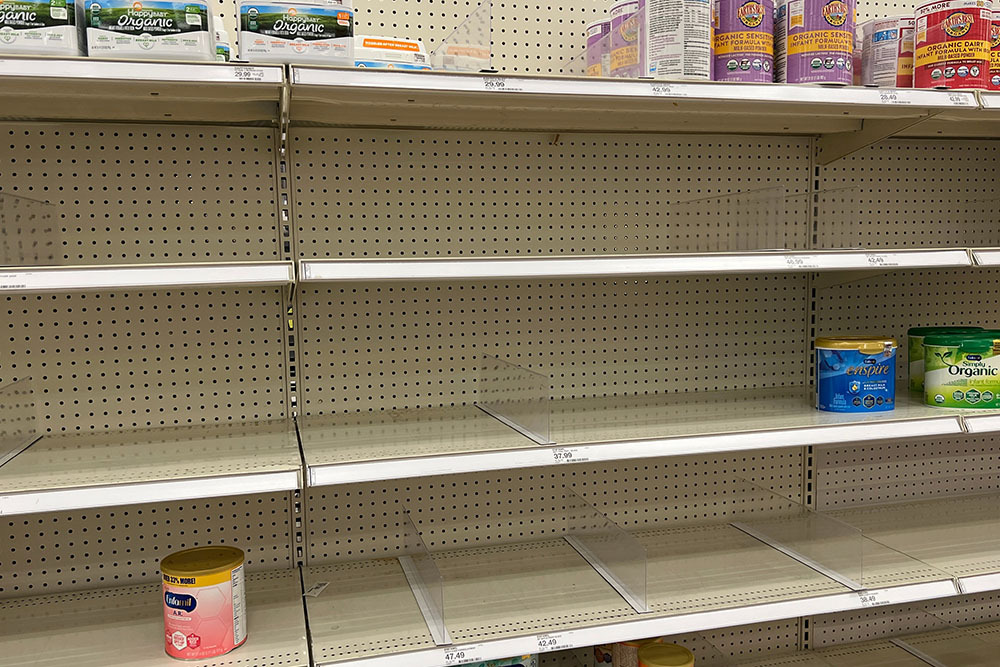Here’s the Latest on the U.S. Baby Formula Shortage

The Abbott Nutrition formula plant may be reopening as early as two weeks from today—but that's still too late for many parents.
By now, we’ve all seen the painful evidence of empty shelves offering scarce amounts of baby formula in local grocery stores and supermarkets. Day after day, worried parents make trips across town(s) in search of this basic necessity their infants need to survive; Facebook mom groups have become mobile markets for mothers buying, trading and offering whatever they have—whatever they’ve been able to find—to other moms desperately searching for their baby’s next meal. And if a parent is actually fortunate enough to find and purchase formula, retailers like Target, CVS and Walgreens are limiting how much you can buy, usually three or four cans at a time. (And for hungry newborns feeding every two hours, that may not be enough of a supply to have on hand.)
Healthcare professionals are stepping in where they can, but it’s not a long term solution. Zannie Carroll-Williams from Washington says mothers call the doctor’s office where she works in a panic because they can’t find formula or get WIC vouchers fulfilled due to the shortage. Thankfully, their staff has been able to give formula to patients in need, but there’s only so much to go around.
Rachel Temple, a mom of 11-month-old twins in Connecticut, says she’s had to switch her twins’ formula a total of four times in the last few months. The transitions have been so stressful that she’s now switching her babies from formula to whole milk a month early.
How did we get here? And what’s being done to get us out of this grim situation?
Unfortunately, the shortage has gotten increasingly worse over the past few months and has finally gained national attention. At major retailers across the nation, 43 percent of the top-selling baby formula products were out of stock the week of May 8, according to the most recent analysis from Datasembly. States like Tennessee, Texas, Iowa, North and South Dakota are being hit especially hard, where at least 50 percent of formula products are completely sold out.
The shortage is particularly difficult for parents of children who have dietary restrictions and intolerances, such as a dairy allergy, or a preemie requiring a high-calorie formula. Ashley Benton, a single mom in Texas, knows this struggle all too well.
“As a single mother, I was on WIC. My son is on the most expensive amino acid formula on the market, totaling $850 a month. Needless to say, I cannot afford that. Since the shortage started and I can’t find the formula he was on, the three different amino acid [formulas] I’ve switched him to have slowly become unavailable one after another. I’ve been paying out of pocket because WIC only approves the specialty formulas with a prescription, and my pediatrician can’t keep up with writing new prescriptions every week because I can’t find the correct formula. I’ve given up hope that I can find the formula he needs and decided to put him back on hypoallergenic formula. His tummy has been upset, but he’s not starving. This has been the most stressful thing of my life.”
These types of hypoallergenic and specialty formula brands are indeed hard to find on a regular basis. What’s worse, they’re being sold for profit on the black market by sellers on Facebook Marketplace and other platforms price-gouging desperate parents who feel they are running out of options.
“I live in a small town and my daughter is on a hypoallergenic formula,” says Molly Elizabeth from Texas. “[Amazon] increased the price of [her formula] a ridiculous amount, but it was the only way we could guarantee we’d have it, … but now they are completely out of stock too and won’t be getting more. The stores in my town typically get one shipment of this formula a week, and if you aren’t there when it’s delivered, it’s gone. We’ve had to have family in larger cities find [formula] if possible and mail it to us. We’re down to our last few days of formula at this point and are trying to figure out what to do with our pediatrician.”
This simple-yet-increasingly complex act of mothers trying to nourish their children is felt nationwide, as 26 states in total are currently experiencing shortages. The worsening supply issue continues on the heels of the U.S. Supreme Court’s possible decision to overturn Roe v. Wade, the 1973 landmark decision that protects a pregnant woman’s right to choose to have an abortion. While the decision to abort is wholly personal and between a woman and her doctor, it’s important to pause and recognize the inconsistency of lawmakers insisting on the protection of babies through dismantling a woman’s right to choose during a national formula shortage, which one can also argue fails to protect babies.
At 54 percent, the majority of our country supports legalized abortion. And in the midst of fighting for women’s rights, mothers and parents are still holding their breaths hoping this formula shortage takes a turn sooner rather than later.
What Caused the Shortage?
Problems began in 2021 with disruptions to labor numbers, raw materials and other factors stemming from the coronavirus pandemic. This combination led to supply chain issues everywhere, and unfortunately didn’t spare the infant formula industry.
Then in February of this year, the U.S. Food and Drug Administration (FDA) launched an investigation into brands Similac, Alimentum and EleCare after four complaints of the environmental bacterium Cronobacter sakazakii found in infants who consumed powdered formula products from the Abbott Nutrition facility in Sturgis, Michigan. All four babies were hospitalized and two tragically died. After the FDA concluded Abbott “did not ensure that all surfaces that contacted infant formula were maintained to protect infant formula from being contaminated by any source,” the plant shut down production and issued a recall.
Abbott is a major player in the formula industry and produces the vast majority of the U.S. formula supply. The recall in conjunction with halted production have further exacerbated supply chain issues felt from COVID-19 and continue to intensify the shortage.
What’s Being Done to Help?
For weeks senators have been urging the FDA to take action and move forward with the approval process of reopening the Abbott plant in Sturgis, Michigan, and it appears those pleas are finally being heard.
On May 11, Abbott announced that pending the approval from the FDA, operations could be up and running in the very near future.
“Subject to FDA approval, we could restart the site within two weeks. We would begin production of EleCare, Alimentum and metabolic formulas first and then begin production of Similac and other formulas. From the time we restart the site, it will take six to eight weeks before product is available on shelves,” the Abbott statement said.
The company says it “immediately implemented” corrections to address the concerns raised by the FDA and acknowledged that the baby formula recall and production issues contributed greatly to the nationwide shortage.
“ … we’ve been seeing and hearing the stress and despair of parents who are facing empty shelves,” Abbott said. “We deeply regret the situation and since the recall, we’ve been working to increase supply at our other FDA-registered facilities, including bringing in Similac from [another site]. We also began releasing metabolic formulas that were on hold earlier this month at the FDA’s request to those who need these unique formulas.”
While opening the plant is a move in the right direction, parents are still encouraged to talk with their pediatrician before giving their babies formula from Abbott laboratories.
“There’s still some risk from the formula because we know there are problems at the plant and the FDA hasn’t identified a root cause,” said Sarah Sorscher of the Center for Science in the Public Interest. “But it’s worth releasing because these infants might die without it.”
In the meantime, parents should also consult their pediatrician before feeding their children alternatives to formula, which can be dangerous and potentially deadly. Making homemade formula or watering down store-bought formula to extend its use are also hazardous and should be avoided at all costs.
By Lauren Lisle







